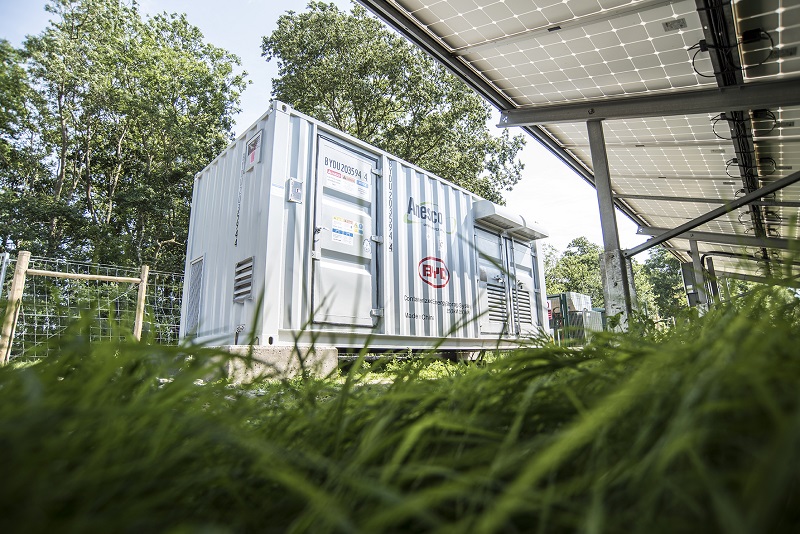By 2021, the U.K. may well be on the outside of the EU looking in (although protracted Brexit talks currently show little sign of clambering above the morass of red tape), but the nation could be a world leader in energy storage deployment by then – provided the government exhibits hitherto-unseen levels of forward planning, argues a new report by the All-Party Parliamentary Group (APPG) on Energy Storage.
According to the report, the U.K. could have 12 GW of subsidy-free battery storage deployed nationwide by 2021 if the government can learn the lessons of the solar industry’s growth trajectory by carefully supporting policies and measures designed to deliver greater energy security to the country.
The report stresses that the capacity for cost reduction of battery storage technologies should not be underestimated in the way that solar PV was. As solar costs tumbled, the government – which had introduced generous FITs to encourage the uptake of PV – panicked and prematurely stripped away much of the support for solar .
The APPG report states that storage and solar share many similar characteristics, chiefly that both technologies enjoy massive and sustained cost reductions the more capacity is deployed and embraced. Equally, the general public is largely supportive of energy storage in the same way that solar remains a much-loved energy source.
These synergies should act as guiding principles to government to ensure that storage support is nuanced, realistic and free from the types of policy inconsistency that so spooked solar, said the report.
In 2011, energy regulator Ofgem estimated that solar PV deployment in the U.K. would reach 7 GW by 2030. In fact, the nation reached 12 GW by 2016. Accurately forecasting renewable growth has proven a rather poisoned chalice, but the APPG report simply implores government to become eager students of history and avoid the same mistakes with storage – a disruptive technology that holds immense promise in expediting the U.K.’s green energy transition and shoring up its energy independence.
“Significant battery storage deployment is possible if the government keeps to the targets and timelines it has already set for encouraging electricity system flexibility,” urged APPG chair Peter Aldous MP. “12 GW of battery storage would improve the U.K.’s energy security, would help us maximize our energy self-sufficiency, and empower consumers across the country as they are more able to manage their bills and take personal action to reduce carbon emissions.
“Such a significant amount of battery storage deployment would also support the government’s ambitions to develop the U.K. into a battery manufacturing powerhouse, evidenced in the Faraday Challenge funding announcements last week. Battery manufacturing would create new jobs and exportable expertise post-Brexit.”
Nina Skorupska, chief executive of the Renewable Energy Association (REA), added that the lessons from solar and wind need to be ingested by government ministers to help ensure similar missteps are not taken with storage.
“The technology and deployment patterns for battery storage and solar PV are similar, and this report is intended to drive big thinking and put the UK on the front foot, rather than react after-the-fact,” Skorupska said.
The APPG report looks at a range of factors, including projections for battery cost decline and proposed policy changes from the Department for Business, Energy, and Industrial Strategy (BEIS), the energy regulator Ofgem, and National Grid, and lays out three scenarios for battery storage deployment by the end of 2021. That 12 GW figure is the most optimistic of the scenarios, with the authors of the report stressing that the more realistic goal is a deployment of 8 GW of storage capacity.
Under the fledgling Faraday Challenge, the British government does at least appear to have put its money where its mouth is, funding a series of promising battery research ventures at universities and institutes across the country in recent weeks.
This content is protected by copyright and may not be reused. If you want to cooperate with us and would like to reuse some of our content, please contact: editors@pv-magazine.com.



By submitting this form you agree to pv magazine using your data for the purposes of publishing your comment.
Your personal data will only be disclosed or otherwise transmitted to third parties for the purposes of spam filtering or if this is necessary for technical maintenance of the website. Any other transfer to third parties will not take place unless this is justified on the basis of applicable data protection regulations or if pv magazine is legally obliged to do so.
You may revoke this consent at any time with effect for the future, in which case your personal data will be deleted immediately. Otherwise, your data will be deleted if pv magazine has processed your request or the purpose of data storage is fulfilled.
Further information on data privacy can be found in our Data Protection Policy.